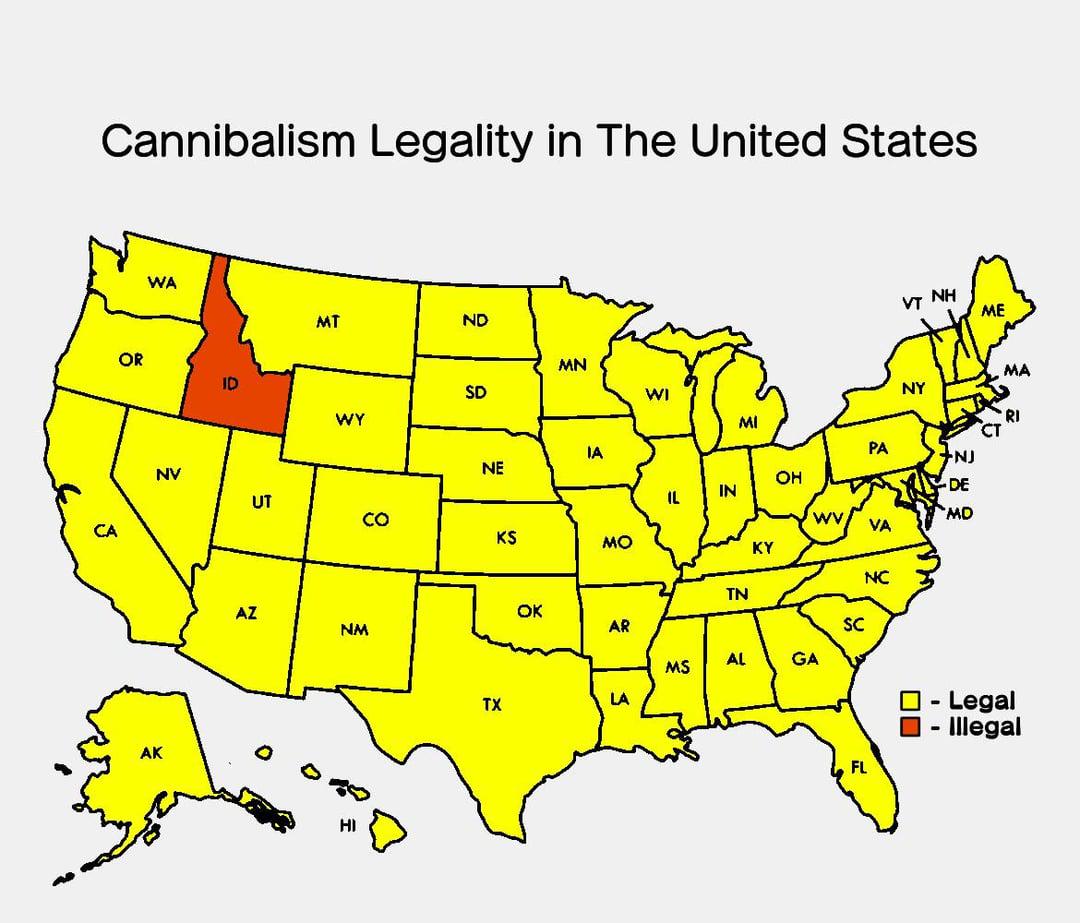Legality of Cannibalism in the USA Map


David Chen
Data Visualization Specialist
David Chen is an expert in transforming complex geographic datasets into compelling visual narratives. He combines his background in computer science ...
Geographic Analysis
What This Map Shows
This visualization displays the legality of cannibalism across the United States, highlighting the nuanced and often perplexing legal landscape surrounding this macabre topic. While one might assume that cannibalism would be uniformly illegal across the country, the reality is far more complex. In Idaho, a state with explicit laws regarding cannibalism, the legal framework explicitly addresses this issue, whereas other states rely on broader laws related to the desecration of corpses and the improper handling of deceased bodies. This map serves as a crucial tool for understanding how different states approach this sensitive subject matter.
Deep Dive into Cannibalism Legislation
Cannibalism, the act of consuming another human’s flesh, raises profound ethical, moral, and legal questions. Despite its rarity, the topic is often sensationalized in popular media, which can lead to misunderstandings about its legal status. In most places, the act of cannibalism is not specifically legislated against; rather, it falls under laws governing the treatment of corpses. For instance, many states have statutes that criminalize the desecration of a corpse, effectively making cannibalism illegal by proxy.
Interestingly, the legal definitions and implications can vary significantly from state to state. In states without specific anti-cannibalism laws, prosecutors often rely on existing statutes about the mutilation, abuse, or improper handling of deceased bodies. This means that even if a person dies of natural causes, using their body for consumption is likely to result in criminal charges. It’s a fascinating intersection of law and morality, where the specifics can change dramatically based on geographical and cultural contexts.
Idaho stands out as the only state with laws explicitly prohibiting cannibalism. The legal text in Idaho addresses the act directly, making it clear that anyone found guilty of cannibalism could face severe penalties. This explicit legislation may stem from Idaho’s unique cultural and historical context, where a clear legal framework was deemed necessary to address potential cases of cannibalism, however unlikely they may be.
In contrast, states like California and New York, which have no specific laws against cannibalism, still prosecute individuals under laws related to corpse desecration or similar statutes. For example, in California, the law states that it is illegal to mutilate or disfigure a dead body, which would encompass acts of cannibalism. In these areas, the legal system often relies on the moral outrage of society to guide the enforcement of these laws, rather than explicit legislation against cannibalism itself.
Regional Analysis
When we analyze the legal framework regarding cannibalism by region, interesting patterns emerge. In the West, Idaho’s unique stance creates a stark contrast with neighboring states like Montana and Wyoming, where cannibalism is not specifically addressed. This raises questions about societal values and the extent to which local culture influences legal practices. The presence of explicit laws in Idaho may serve to reinforce community standards and deter potential acts of cannibalism, even if such acts are exceedingly rare.
Moving to the Midwest, states like Ohio and Michigan mirror the pattern seen in the West, relying on existing laws related to corpse desecration rather than specific anti-cannibalism statutes. Interestingly, these broader laws can lead to unexpected legal outcomes, as the interpretation of what constitutes desecration can vary widely. In the Northeastern states, particularly in urban areas, the focus is often on the treatment of remains in a manner that respects the deceased, with little public discourse about the legality of cannibalism itself.
In the South, the legal landscape regarding cannibalism also leans on existing statutes about corpse handling. States like Florida and Texas have stringent laws regarding the treatment of human remains, which effectively criminalize cannibalism without needing to explicitly mention it. Here, cultural norms around respect for the dead play a significant role in shaping the legal framework.
Significance and Impact
Understanding the legality of cannibalism in the United States is more than a mere academic exercise; it has real-world implications for law enforcement, legal professionals, and society at large. This topic prompts important discussions about ethics, human rights, and the treatment of the deceased. The existence of explicit laws in Idaho suggests a proactive approach to preventing cannibalism, reflecting community values and concerns. Meanwhile, the reliance on broader laws in other states may indicate a more reactive legal system, one that addresses potential issues only when they arise.
As society evolves, it’s worth considering how legal perspectives on cannibalism may shift in the future. Legal scholars and ethicists debate the implications of changing cultural norms and societal values on laws surrounding human remains. Will we see a move towards more explicit legislation in more states, or will the existing frameworks suffice? What’s certain is that the topic of cannibalism, while unsettling, serves as a vital lens through which we can examine broader issues of morality, law, and human behavior in contemporary society.
Visualization Details
- Published
- October 11, 2025
- Views
- 72
Comments
Loading comments...